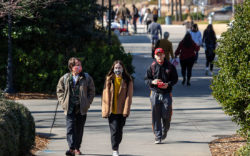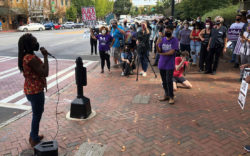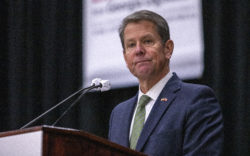Long lines of voters have been waiting to vote early at polling places across Georgia. Given the competitive nature of this year’s election, high voter turnout is expected. But this may be one of the most inelastic elections in U.S. history, with little either President Donald Trump or former Vice President Joe Biden could do to swing a voter toward their camp before Election Day, according to Audrey Haynes, a political science professor at the University of Georgia.
A panel of UGA faculty and students recently joined Haynes online to discuss this year’s election. Haynes and other panelists—public affairs communications professor Joseph Watson, College Republicans Chairman Alex Huskey and Young Democrats President Ramin Zareian—shared their thoughts on recent polls and the campaign strategies of Biden and Trump.
“This is one of the most inelastic races I’ve ever seen, in the sense that that independent body in the middle—those people who haven’t made up their minds—is smaller than I can recall in my time as a political scientist,” said Haynes, whose research focuses on candidate communication strategy.
If most voters have already decided whom they’d prefer in the Oval Office, it may be important for the presidential candidates to ensure their supporters head to the polls rather than focus on capturing undecided voters, Huskey said during the Oct. 12 web event.
According to the stats-heavy political website FiveThirtyEight, a simulation run 40,000 times from polling data gives Biden an 88 percent chance of winning the election. Huskey, though, said he doesn’t trust the accuracy of polls, questioning if they account for newly registered voters.
It appears Georgia is slowly turning, with Republicans still coming ahead in recent elections but by tighter margins. FiveThirtyEight labels Georgia as a “toss-up” state, in which both Biden and Trump hold about an equal chance of winning the state.
“Georgia is going to be a competitive race, and I think the president’s team has recognized that,” Huskey said. “They’ve been in Georgia full force, not only in Atlanta but in more rural areas. As long as you can get those rural voters out who are going to vote reliably Republican, then that’ll make up for the difference that Atlanta will bring out.”
While Trump runs a “catch-up” campaign—hurling anything and everything at Biden in the hopes something sticks—Biden is campaigning as a frontrunner, avoiding negative attack ads and focusing on his vision for the nation, Haynes said.
“If Trump is trying to increase turnout among his base who already support him, I’m sure fear is a strong motivator,” said Zareian about attack ads against Biden. “For Biden, who’s trying to make a broad appeal… talking about how he’s not trying to just bring us back to normalcy, but make improvements on things like access to health care and education, gives people more of a desire to go out of their way to vote for him, especially people who may have not sided with him in the primaries.”
The 2020 campaign strategy for Trump is the same strategy he used in 2016, Watson said. While it worked to his advantage against the former Democratic nominee Hillary Clinton, it may not have the same effect in this year’s election, he said.
“I think those things worked [for Trump] in 2016 because Clinton was both a poor and flawed candidate,” Watson said. “Joe Biden is not that. He probably has more national campaign experience of anybody who has run for president in recent memory. I think that shows in terms of the approach and the messaging discipline. You don’t win elections with erratic messaging; you’ve got to have discipline.”
No matter who comes out victorious in the presidential election, political polarization will likely continue its upward trajectory. To cut through it, Haynes said politicians would need to stop actively campaigning while in office, a trend she said she’s noticed in recent years. If Biden were to win, it may extinguish some of the misconceptions reliably Republican voters hold about progressive policies, Zareian said.
Haynes asked the heads of the student political groups how they reconcile the constant slew of scandals surrounding Trump, like Russian interference in the 2016 election, his admission to downplaying the COVID-19 pandemic in an interview with journalist Bob Woodward and the revelations about his taxes reported by the New York Times. Nevertheless, Trump continues to deny allegations while his loyal base shows unwavering support. Huskey said it’s difficult to know what’s true in today’s media environment, and Zareian said Trump may continue to receive support from his base no matter what he does.
“Based on our experiences dealing with Trump in the past five years or so, it shows that he can say certain things, but it will not really have any significant effect on his electoral chances,” Zareian said. “I’ve lost faith that it will actually have a serious consequence on the outcome of the election.”
Like what you just read? Support Flagpole by making a donation today. Every dollar you give helps fund our ongoing mission to provide Athens with quality, independent journalism.










